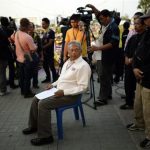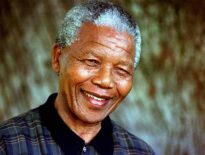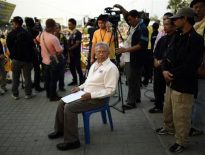(Reuters) – North Korea could be facing its most serious defection in 15 years as South Korean media on Friday that a man who managed funds for the ousted uncle of leader Kim Jong Un had fled the isolated country and sought asylum in South Korea.

The aide, who was not named, was being protected by South Korean officials in a secret location in China, cable news network YTN and Kyunghyang Shinmun newspaper said, citing sources familiar with the matter.
South Korea’s National Intelligence Service (NIS) had no knowledge of the defection, lawmakers said in Seoul after they were briefed by the head of the spy agency.
YTN said the man managed funds for Jang Song Thaek, whose marriage to Kim’s aunt and proximity to the young leader made him one of the most powerful men in North Korea.
Jang was relieved of his posts last month, according to the NIS, and the television network said the sacking could have followed the aide’s defection.
YTN said the aide also had knowledge of funds belonging to Kim and his father, former North Korean leader Kim Jong Il. If true, the defection would likely be the first time in 15 years a significant insider from the Pyongyang regime has switched sides.
Impoverished but nuclear-capable North Korea and the rich, democratic South are still technically at war after their 1950-53 conflict ended in a truce, not a peace treaty.
A spokesman for South Korea’s Unification Ministry, Kim Eui-do, and officials at the Foreign Ministry said the defection report could not be confirmed.
Jung Chung-rae, a member of the South Korean parliament’s Intelligence Committee, told reporters the intelligence service had said it did not know about the defection, but that two of Jang’s relatives who were serving in embassies overseas had been recalled.
It is true that Jang’s brother-in-law and nephew have been called back to North Korea, Jung cited the NIS as saying.
Jang himself is alive and appears to be safe, South Korean officials have said.
Jang has survived previous purges and official displeasure, thanks largely to his sometimes tempestuous marriage to Kim Kyong Hui, the daughter of North Korea’s founder, Kim Il Sung.
WE DO NOT UNDERSTAND THE SITUATION, CHINA SAYS
North Korea’s ruling Kim family is deeply venerated and feared. It is ruthless about protecting its security and privacy and little is known about the inner workings of the regime.
The aide requested asylum about two months ago and was currently in China, YTN said. In Beijing, there were no signs of any additional security around the South Korean embassy.
Asked about the South Korean media reports, Chinese Foreign Ministry spokesman Hong Lei said: “We have noted the reports, but do not understand the situation.”
South Korea’s intelligence service has also said two of Jang’s close associates were executed last month for corruption.
These reports have not been confirmed either.
YTN said Jang’s aide fled to China some time in late September or early October and that Jang could have been sacked because of this.
A source familiar with the matter said the aide immediately requested asylum from the South Korean government and South Korean officials are currently protecting him at a secret place in China, it said.
China, Pyongyang’s only major ally, usually resists allowing defectors from North Korea to seek asylum elsewhere.
YTN said the aide tried to escape to Laos, a route favored by other defectors, but Chinese authorities prevented him from leaving.
U.S. officials have also sought custody of the aide, the television station said.
About 25,000 North Koreans have defected to the South but few of them were highly placed in Pyongyang.
The major defectors include Hwang Jang Yop, a high-level Worker’s Party ideologue who was the architect of the Juche (self-reliance) ideology of North Korea, who sought asylum in the South in 1997.
Kim Jong Un’s aunt, his mother’s sister, fled to the United States in 1998, media reports have said.
In 2002, a North Korean nuclear scientist named Kyong Won Ha escaped the country, although few details are known.
(Reporting by Ju-min Park and Jack Kim; Editing by Raju Gopalakrishnan and Nick Macfie)





